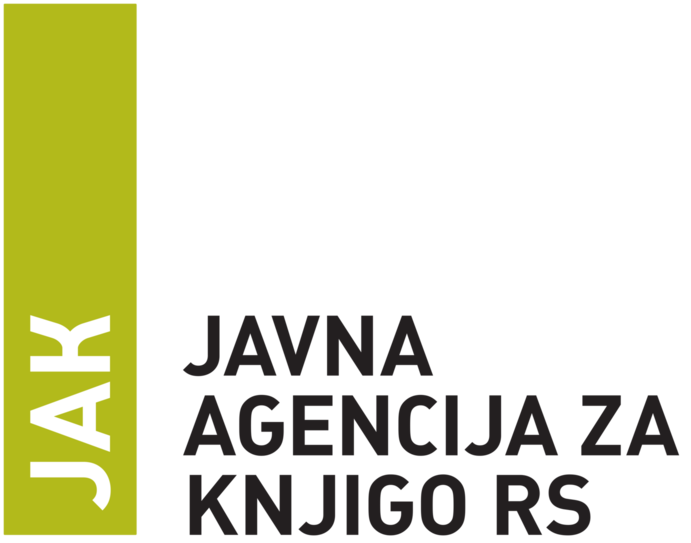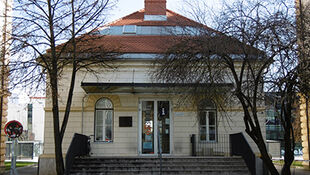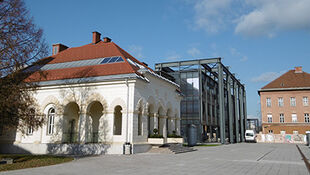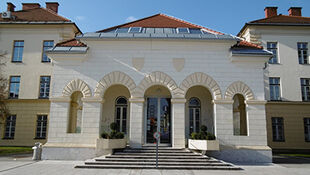Slovenian Authors and Publishers in Vienna, 26–29 April 2016
Without conventions in this vein, neighbouring cultures would remain just that - neighbours, who may know about each other, but never speak to one another. It was a pleasure to participate and I look forward to do so in the future. (Andrej Hočevar, editor, LUD Literatura)
Four evenings dedicated to Slovenian literature have enticed the Viennese audience with an exciting programme, with Slovenian works translated into German, and with performances by authors that will definitely be considered among the most intriguing events of the year - as Manfred Müller, head of the "Österreichische Gesellschaft für Literatur" Austrian Literature Society described the evening with Boris Pahor. Despite a part of the audience having to remain standing throughout the event, they gladly persevered for a full two hours.
The inaugural Tuesday event unfolded in a relaxed atmosphere at the PHIL bookstore at Gumperndorfer Straße - one of the most popular central bookstores that, among many other things, also serves as a café and an open-air cinema. With courtesy of the Slovenian boutique brewery Reservoir Dogs, the audience was graced with the opportunity to both taste and lend an ear to the "Slovenian" by listening to the poetry of Cvetka Lipuš, Ana Pepelnik, young Austrian poet Verena Mermer, and the host of the evening - Austrian slam poet Robert Prosser. Davorin Lenko, who conversed with the audience in German, represented the Slovenian prose section by touching upon the German translation of his debut novel Telesa v temi (Körper im Dunklem, Litterae Slovenicae, 2016).
Wednesday afternoon was reserved for a visit to various Austrian publishing houses and bookstores. The fairly strong Slovenian delegation began their rounds by visiting the editor-in-chief of the Zsolnay publishing house (which has been a part of the influential Hanser Group for the past few of years) and then stopping by the Folio publishing house, where Drago Jančar has been the "bearer of the Slovenian flag" for a fair while and where Goran Vojnović recently saw the publishing of a translation of his work into German. Still, all of us unanimously agreed with a sentiment emanating from the announcement of the "Slovenian literary tour" in the Vienna-based newspaper Falter - Slovenija: A land so near and so scarcely known. This statement is not painful for the Slovenian Tourist Board alone - it gravely affects the Slovenian publishing industry as well. Fortunately, we found some solace while engaged in collectively browsing through the repository at Jeller, one of the most charming independent bookstores in Vienna. The bookstore, maintained by the legendary book dealer Anna Jeller, has been a staple of the 4th district for several decades. Alas, unnerving thoughts about the domestic bookstore landscape cropped up unsolicited...
What can be learned from publishing peers when the rare opportunity arises to meet in the editorial departments and exchange experiences, ideas, questions and even numbers while not being restricted to exchanging common courtesies alone manifested itself in the scope of the face-to-face meetings with our distinguished colleagues at Zsolnay and Folio. The exchange was both beneficial and inspiring: from e-book market strategies, all the way to PR measures, challenges brought about by remission and scouting new authors ... (Valentina Smej Novak, Totaliteta)
During the evening, the focus fell on the "Alte Schmiede" cultural centre, where Aleš Šteger unveiled the 'freshly printed' German translation of his novel Odpusti (Archiv der toten Seelen, Schoeffling, 2016). The author read excerpts from the novel in both Slovene and German with the same intriguing panache. Meanwhile, Boris Pahor, who was actually born during Austro-Hungarian period, arrived in the capital of the late empire to grace the audience with his presence on Thursday at the headquarters of the distinguished Austrian Literature Society - one of the oldest literary institutions in Vienna. He spoke freely about the fallen dual monarchy and the current European Union, which appears to be coming close to sharing the abolished empire's fate. Boris Pahor was joined by his long-time friend, renowned philologist and co-translator of his novel Nekropola (Nekropoli) into German Thomas Poiss. What constitutes an "embarrassment to the German publisher", as Cornelius Hell, the host of the discussion put it, the book is out of print. Auspiciously, we had the rare privilege of listening to an excerpt from the book read by Boris Pahor himself.
As on Thursday, the sterling work of interpreter Amalija Maček was key for the enjoyment of the predominately German-speaking on Friday as well as all of the guests featured on stage at the "Hauptbücherei Wien" central bookstore spoke Slovene. The event featured appearances by Carinthian-Slovene ORF Culture Editor Katja Gasser as hostess; Carinthian-Slovene author Maja Haderlap, who was asked for autographs while on her way to the stage already; and Goran Vojnović, the guest of honour in light of the publication of the German translation of his novel Jugoslavija, moja dežela (Vaters Land, Folio, 2016) who adorned more than just a few covers of the newly-issued book with his personal signature. Crowds of several hundred people, stunned silence during the reading by translator Klaus Detlef Olof, and the upbeat discussion that followed may have, in addition to a fairly strong media presence and the author's mini-tour of Germany, contributed to the fact that Goran Vojnović's novel has been included on the monthly (May) recommended reading list of the German public radio and TV network Südwestrundfunk - SWR (http://www.swr.de/bestenliste).



 EN
EN
 RSS
RSS



 Novičnik
Novičnik 









 EN
EN
 RSS
RSS